DONALD TRUMP’S RIDICULOUS trade war, which is making enemies of our closest allies around the world—especially our northern and southern neighbors, Canada and Mexico—is an exercise in failed foreign relations and an example of Trump’s infinite pettiness. Trump thinks flexing his flabby muscles is strength. He’s delusional. Every word out of his sinkhole of a mouth and every action he takes may be strongman tactics, but they actually display what an infinitesimally small human spirit resides in his oafish physical body. He’s a classic evil villain.
And because of our past leadership of the Free World (no longer since we’re now a fascist state), world leaders have to tiptoe around Trump’s buffoonery. Men and women of integrity must disagree politely rather than directing their solid factual reasoning at his ridiculousness.
Hold that thought….
I’M FROM THE South—Arkansas—and being a Southerner is tricky. We Southerners have grown up in one of the most interesting regions of the country. We have, hands down, the best food. We have gorgeous mountains—the Appalachians (including the magnificent Blue Ridge), the Ozarks, the Ouachitas. The sumptuous Gulf of Mexico laps our shores from Texas to Florida. And if you haven’t read Jack E. Davis’s Pulitzer Prize-winning book, The Gulf: The Making of An American Sea, grab a copy now. Every American should understand what The Gulf of Mexico means to us.
The cool Atlantic beaches of the East Coast from Maryland to Florida bring breezes and cleanse our air. Yes, as unlikely as it seems, Florida does count as Southern. Sort of. The Mississippi River, the lakes, the streams, college towns with young vibrant energy, cities with character and charm.
During and after Covid, the word was that people were moving away from cities. Many were and still are moving to the South for cheaper taxes, so they could actually buy a house, upgrade their lifestyle. And there’s the mass migration from North to South for retirees (and others)—to Florida and the Carolinas, to Texas, and the latest hot destination appears to be my home state. Great numbers of people are moving to Northwest Arkansas, to be exact…to the land of billionaires: Walmart’s Waltons, Tyson Foods’ Tysons, trucking’s JB Hunt. Northwest Arkansas is on fire.
Some of us Southerners are proud of our heritage, and some of us aren’t. Most of us want to be. But we have become more separated now than since the Civil War. We all know why.
The January 6 assault on the US Capitol capped four years in which Trump relentlessly stoked the nation’s divisions and simultaneously provided oxygen for the growth of White nationalist extremism through his open embrace of racist language and conspiracy theories.
Trump didn’t start it, and this is old news, yet it is central to our political and cultural narrative. After this violent attempted coup, which Trump led, Americans still elected him for the second time. The fact that this could happen, did happen—that he could even run again after leading this insurrection, not to mention being a convicted felon and an adjudicated sexual abuser—is morally wrong and should be unquestionably illegal. How did a failure on this scale happen in our democracy?
We all knew the South would be Red for the election. The South is Red, and this is a huge problem for those of us who aren’t but who live in the South. In the days when life and politics were civil in the United States, it wasn’t a problem to live side by side with neighbors who might not see or believe the same way we did. They weren’t buying AR15s and worshipping guns, nor were they openly spewing hate and chanting about a white Jesus even though he was a brown Jew. Evangelical preachers may have been preaching hellfire and brimstone, but they weren’t admonishing their congregation to hate their countrymen. They weren’t down with our beloved democracy being ripped apart to become a fascist state.
I didn’t feel “Southern” growing up. I came from a family that revolved around my two brothers and me. Our mom had a college degree in Home Economics and worked after college until she got married. She had three children in four years and cooked three meals a day, making sure—à la Dr. Spock—that she didn’t dampen our little spirits. Our dad was a lawyer in the mold of Atticus Finch. We were raised to enjoy freedom, though we were expected to behave and to mind adults as well as our manners. We went to the Methodist church on Sundays. No one we knew proselytized to anyone, no matter where, or if, they went to church.
In the summer, we caught lightning bugs and ran through our neighborhoods till our parents called us home for supper. Local farmers came to our doors to sell fresh produce, and the women of the house shelled bushels of peas, shucked corn, and fried okra and chicken. We kept a country ham in the storage room on our carport in winter, and my father would go out in the morning and slice some up for breakfast. My mother made homemade buttermilk biscuits almost every day.
The Civil War was something that happened in history, but it really meant nothing to me. We had my great-great-grandfather’s sword hanging above our fireplace, but it was a piece of decor. Later, I worked as an editor for Southern Magazine, which was like a Southern Esquire. We endlessly debated what it meant to be Southern, but I still didn’t feel Southern. I think I felt like part of a bigger whole…like an American? But I began to comprehend what being Southern was, and it was part of me on some level. My brother, Brent, went to Yale and lived in New York. He didn’t try to hide his Southernness like some Southerners do. He was brilliant, handsome, and charming, and he made the most of it.
IN 2012, WHEN MY husband and I returned to the U.S. after living 10 years in France, I didn’t want to move back to the South. Been there, done that. And so much had changed while we were in Europe, including the Christian nationalist toxicity, the dumbing down that I’ve written so much about, the intolerance along with the hatred that was infusing our society through social media; it was choking liberal lives and public discourse.
But for various reasons we did move back to Arkansas, although we didn’t intend to stay there. We kept trying to figure out where we wanted to be. The Weight of the South was in all our discussions, because living in the South had become a burden to bear. But I didn’t feel at home anywhere in the United States. Halfway through the administration of this nation’s first Black president, the open bigotry and fanaticism felt suffocating. It was only four years before Donald Trump and his MAGA hordes would burst on the scene and begin to capitalize on the divisions among us.
Today, we’re more divided than ever. Don’t get me wrong—it’s not that my native region didn’t have plenty of problems before all this started. Of course, it did. But this is a completely different level, and the severity of the societal poison is constantly compounded by Trump’s lies and rhetoric.
But lately, because of Trump’s combative tariffs, the headline that most grabbed my attention was this: “Trade War Retaliations Will Hit Trump Voters Hardest.” I admit I said a little “Yippee!”
The jobs that could be hit by retaliation are especially concentrated in pockets of the upper Midwest, South and Southeast, including many rural parts of the country that are responsible for producing agricultural goods. It also includes areas that produce coal, oil, car parts and other manufactured products…
The message foreign countries are trying to send, he said, is, “You think you can bully us, well, we can hurt you too. And by the way, we know where it really matters.”
I’m sorry for the farmers (and others) who will suffer because of Trump’s tariffs, but they voted for him. And aiming at these states is justice in action. Will the financial hit these Americans take make them understand that Trump couldn’t care less about who they are or what they do, how their families will survive—the working men and women, the middle class, you and me?
Mark Cuban got it and suggested Democrats should be tracking all local media and influencers in these states and reposting it everywhere. The economic pain that tariffs can indict on Red states needs to be talked about more than anything else right now. They can flip voters.
Red States pretty much started with the South, and in other pieces I’ve addressed the GOP’s longstanding racist manipulation of voters, which doesn’t change the fact of the racism itself. Was it better before Obama was president, when racism was more hidden? When, at least in polite circles, it carried a stigma of unacceptability? The rampant racism today is being enacted in every step this administration takes, every single action against DEI. This administration makes it loud and clear that every white woman and man in their employ is against diversity, equity, and inclusion. They are racist to the core and proud of it. Ditto the white Christian nationalists. White supremacy is again being enshrined in our culture.
I am a white woman from the South. Racism has always been in my consciousness but not in my day-to-day life. Not in my face. The offensiveness used to be intellectual and not physical. But one of my best friends is a black woman who’s trans. She says that white people didn’t care “till shit started happening to them.” Now, white people are out protesting, but all this time when shit was happening to black people, we sat on our butts. She has a point.
I believe we’ll find our compassion again, but I don’t know how long it will take.
Meanwhile, other liberal people like us feel troubled by the same question: How do we survive here? For a liberal Democrat, The Weight of the South—wherever you live—is a burden to bear.
Please send any questions or comments our community can address and respond to. Peace. We are one.
Activist Of The Week: Mark Cuban, @mcuban.bsky.social
A Few Of My Favorite Social Media Posts And Memes Of The Week:






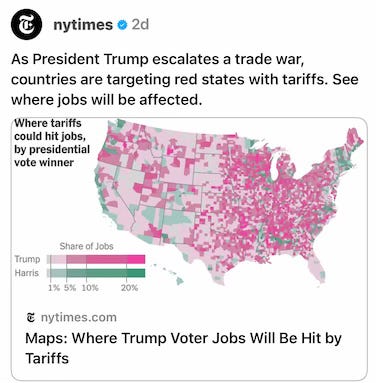
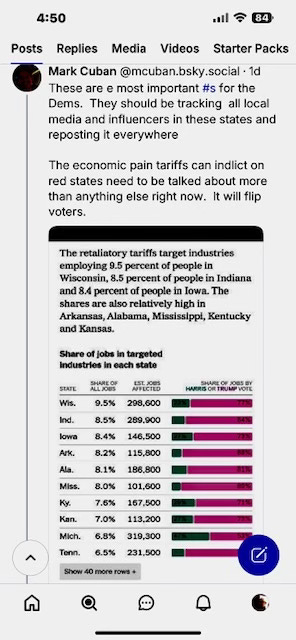
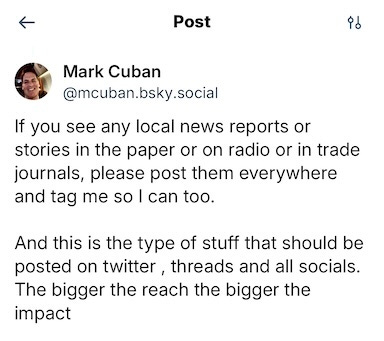

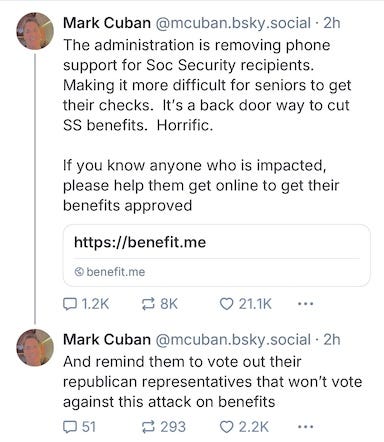

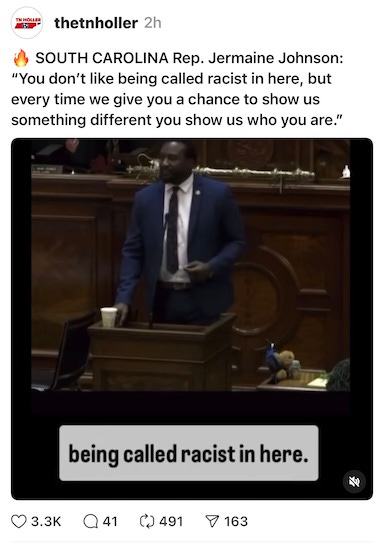
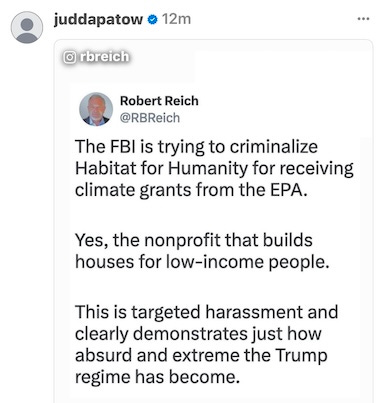
I can definitely relate. My concerns change every day but currently I’m thinking about food banks. I know that there are people in my city struggling to put food on the table.
Excellent work Beth. As I read it, I was so reminded of your family in Batesville, our hometown.
What a mess we are in; I’m especially saddened near my end of days
Keep up the good work and hopeful nature,
Lex